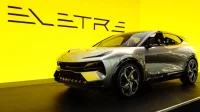The iconic Ford Fiesta, a mainstay on British roads for over four decades, is set to meet its demise as early as next year. This news, first reported by the BBC, throws the spotlight on the shifting landscape of the automotive industry, where electrification reigns supreme.
Rising production costs and a customer preference for SUVs are cited as the key reasons behind this decision. Ford executives are currently in talks with dealers, suppliers, and staff ahead of the official announcement, expected within the next few days.
The news comes as a blow to many, as the Fiesta has remained a popular choice for years. Launched in 1977, it quickly gained favor for its affordability and fuel efficiency, factors particularly influential during the 1973 oil crisis. Over 20 million Fiestas have rolled off production lines worldwide, solidifying its position as a global bestseller.
Despite its past success, the Fiesta has struggled to compete with newer models like the Puma, a small hybrid SUV. This shift in consumer preference reflects the growing demand for higher seating positions, increased cargo space, and a perception of greater safety offered by SUVs.
Furthermore, Ford’s commitment to electrification has played a crucial role in the Fiesta’s demise. The company emphasizes its “all-in” approach to electrification, evident in the development of an electric F-150 pickup and an electric Mustang SUV. This strategic shift necessitates a review of their existing portfolio, and the Fiesta, without an electric counterpart, appears to be the first casualty.
The looming 2030 ban on the sale of new petrol and diesel cars in the UK further fuels the focus on electrification. Ford likely sees the Puma, a smaller and more affordable hybrid offering, as a better fit for the evolving market, especially as the company prioritizes EV development.
This news also marks the end of the Focus model without an electric version in the pipeline. Ford’s hefty $50 billion global investment through 2026 emphasizes their unwavering commitment to electrification. Their goal of delivering over two million electric vehicles annually by 2026 underscores this strategic shift.
The discontinuation of the Fiesta signifies a bittersweet moment in automotive history. While it marks the end of an era for a beloved car, it also highlights the industry’s rapid transformation towards a more sustainable future. With the rise of electric vehicles and changing consumer preferences, the automotive landscape continues to evolve, shaping the cars we drive and the roads we navigate.



